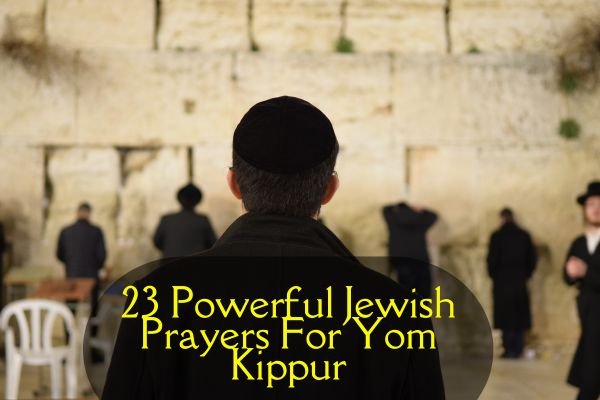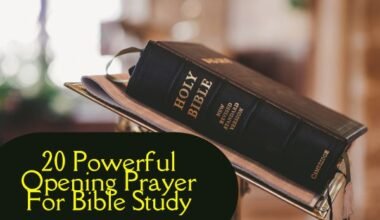Yom Kippur, the Day of Atonement, is a solemn and sacred day in the Jewish calendar. It is a time for introspection, repentance, and seeking forgiveness for sins committed throughout the year. The observance of Yom Kippur is marked by a series of prayers and rituals that span from dawn to dusk.
At the heart of Yom Kippur lies the concept of teshuvah, which encompasses repentance, restitution, and spiritual renewal. It is a time to confront our shortcomings, acknowledge our mistakes, and strive to make amends. The prayers recited on Yom Kippur reflect these themes, offering expressions of remorse, supplication, and hope for redemption.
Jewish Prayers For Yom Kippur
As we look into the world of Jewish prayers for Yom Kippur, we will explore a history of heartfelt expressions that have been passed down through generations. From the Selichot, the penitential prayers recited before Yom Kippur, to the Neilah, the closing prayers of the day, each prayer offers a unique window into the soul of the Jewish people.
1. Kol Nidre
“All vows… which we may vow, swear, or pledge… we declare null and void.”
The Kol Nidre prayer, recited at the beginning of Yom Kippur, is a solemn annulment of vows made during the year, seeking release from promises that were not kept.
2. Vidui (Confession)
“We have sinned, we have betrayed, we have stolen…”
This prayer of confession, also known as Ashamnu, is recited repeatedly throughout Yom Kippur, acknowledging a comprehensive list of sins committed by the community.
3. Al Chet (For the Sin)
“For the sin we have committed before You…”
Al Chet is a detailed confession of various sins, recited multiple times, asking God for forgiveness for transgressions committed intentionally or unintentionally.
4. Avinu Malkeinu
“Our Father, Our King, have mercy on us.”
A central prayer asking God to act with compassion and grace, recognizing His role as both a loving father and a sovereign king.
5. Unetaneh Tokef
“Who will live and who will die… who will be at peace and who will suffer…”
This profound prayer highlights the severity of the Day of Judgment, acknowledging that life and death are in God’s hands.
6. Shema Yisrael
“Hear, O Israel: The Lord is our God, the Lord is One.”
Reciting the Shema affirms God’s oneness and the Jewish people’s commitment to Him, a declaration of faith said during the most solemn moments of Yom Kippur.
7. Selichot (Prayers for Forgiveness)
“Forgive us, our Father, for we have sinned; pardon us, our King, for we have transgressed.”
Selichot prayers ask for God’s mercy and forgiveness for personal and communal sins.
8. Ne’ilah
“Seal us in the Book of Life.”
The closing prayer of Yom Kippur, Ne’ilah marks the final plea for God’s mercy before the gates of heaven “close.”
9. HaMelech (The King)
“The King sits on His throne, exalted and lifted up.”
This prayer acknowledges God’s majesty and sovereignty, central to the Yom Kippur service, emphasizing His power and judgment.
10. Tefillah Zakkah
“My God, before I am judged, I ask for forgiveness.”
Tefillah Zakkah is a personal prayer for purification and forgiveness, recited before Kol Nidre to clear the soul of sin.
11. Yizkor
“May God remember the soul of my loved one.”
Yizkor is a memorial prayer recited for deceased loved ones, asking God to grant them peace and spiritual elevation.
12. Shehecheyanu
“Blessed are You… Who has granted us life, sustained us, and enabled us to reach this occasion.”
This prayer expresses gratitude to God for allowing the Jewish people to experience Yom Kippur.
13. Baruch Shem Kavod
“Blessed be the name of His glorious kingdom forever and ever.”
A prayer whispered after the Shema, emphasizing God’s eternal kingship.
14. Ashamnu (We Have Sinned)
“We have sinned, we have rebelled…”
Part of the Vidui (Confession), this is a shorter alphabetical listing of sins, focusing on communal repentance.
15. Birkat Kohanim (Priestly Blessing)
“May the Lord bless you and keep you…”
The Priestly Blessing is recited during the Yom Kippur service, asking for God’s protection, favor, and peace.
16. Chatanu Lefanecha (We Have Sinned Before You)
“We have sinned before You, have mercy on us.”
This plea for mercy and forgiveness acknowledges the people’s sins directly before God.
17. Psalm 130 (Shir HaMa’alot)
“Out of the depths I cry to You, O Lord.”
This psalm is a plea for God’s mercy and redemption, reflecting the themes of repentance and divine forgiveness.
18. Adon Olam
“The Lord of the world, who reigned before any form was created…”
A prayer recited at the end of Yom Kippur, expressing God’s eternal reign and the people’s trust in His protection.
19. Kaddish
“Magnified and sanctified be His great name…”
The Kaddish is a prayer that exalts God’s name and is recited multiple times during the Yom Kippur service, often by those mourning or remembering deceased loved ones.
20. El Nora Alila
“God of awe, grant pardon for our sins.”
A traditional Sephardic hymn sung during Ne’ilah, asking for forgiveness before the gates of heaven close.
21. Aleinu
“It is our duty to praise the Master of all.”
This prayer, recited at the conclusion of every service, acknowledges God’s sovereignty and the special role of the Jewish people in serving Him.
22. Mechalkel Chayim
“You sustain life with kindness and mercy.”
Part of the Amidah prayer, this line reflects God’s continuous support and sustenance of life, even as He judges on Yom Kippur.
23. El Melech Yoshev (Merciful King)
“O King who sits upon the throne of mercy…”
This prayer highlights God’s role as both judge and merciful ruler, asking for His compassion in judgment.
Conclusion
Yom Kippur, the Day of Atonement, is a time for deep introspection and spiritual renewal. Through the power of prayer, individuals seek forgiveness, reflect on their actions, and reconnect with God. The prayers recited on this sacred day, such as Kol Nidre, Vidui, and Ne’ilah, offer opportunities for personal transformation, bringing the Jewish community together in repentance and hope for a better year. Each prayer embodies the themes of humility, mercy, and faith, allowing worshippers to open their hearts and embrace God’s compassion and judgment.
As the holiest day in the Jewish calendar, Yom Kippur encourages a heightened sense of spiritual awareness and responsibility. These powerful prayers serve as a guide for seeking forgiveness, finding peace, and renewing one’s commitment to living a righteous and purposeful life. With God’s mercy and the sincerity of heartfelt prayers, Yom Kippur becomes not just a day of reflection, but one of profound renewal and connection with the divine.







